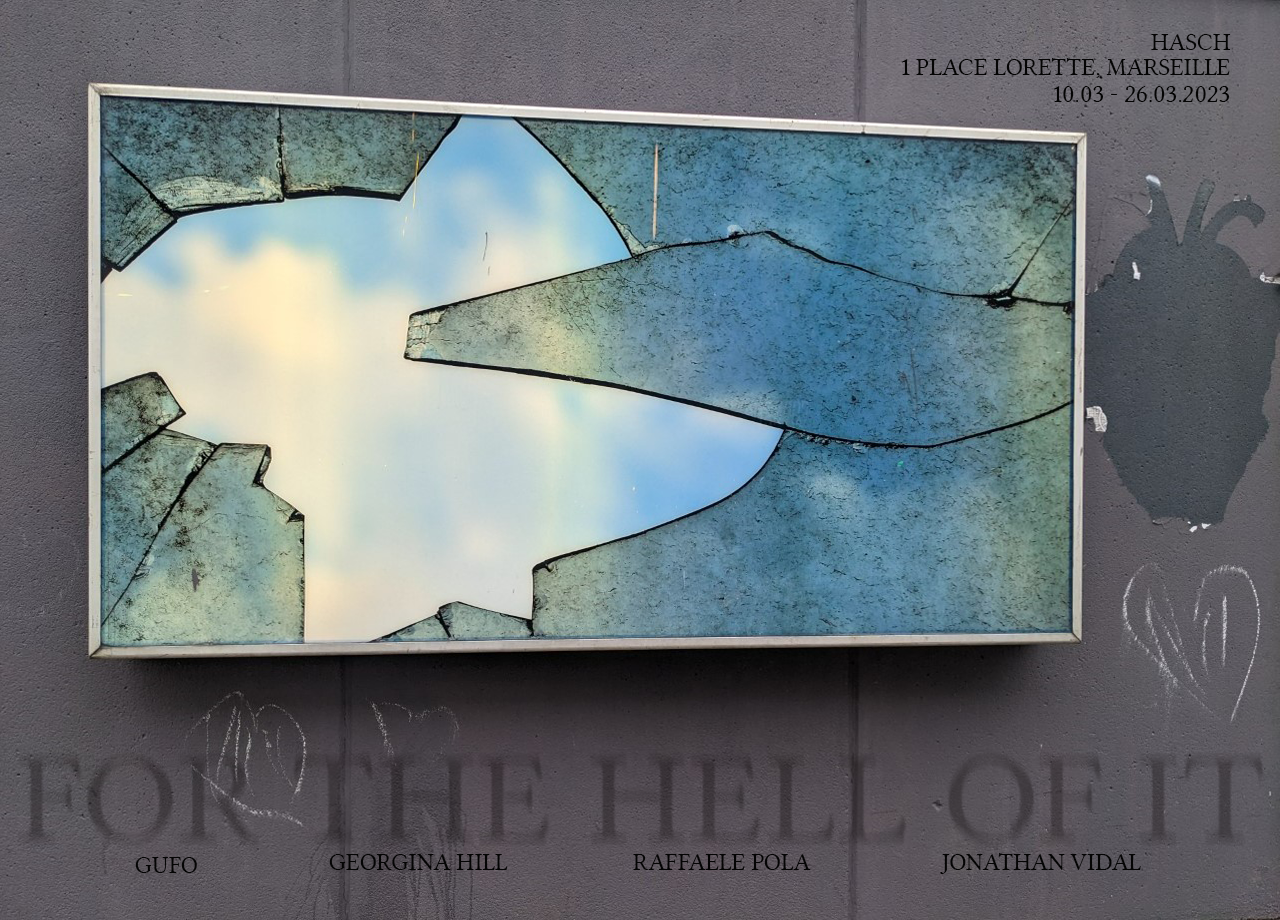For the hell of it at Hasch, with Guffo, Georgina Hill, Raffaele Pola, Jonathan Vidal, Marseille 2024
«
Je m’approchai du balcon et je me saisis d’un petit pot de fleurs, et quand
l’homme reparut au débouché de la porte, je laissai tomber perpendiculairement
mon engin de guerre sur le rebord postérieur de ses crochets ; et le choc le renversant,
il acheva de briser sous son dos toute sa pauvre fortune ambulatoire qui rendit
le bruit éclatant d’un palais de cristal crevé par la foudre.1 »
À la
manière des enfants qui découplent les gendarmes alors qu’ils rampent dans une
danse asymétrique pour la procréation propre à leur espèce : ils prétendent
vouloir les remettre dans « le droit chemin », mais prennent surtout
un malin plaisir à les décoller et connaissent la bestialité de leur geste.
Comme cuire des limaces. Comme brûler des voitures. Comme se murger la gueule
ou tuer le ver, ce qui nous ramènerait au verre, celui qui s’explose à la fin
du Mauvais Vitrier dont nous venons de lire l’extrait. Ce penchant psychologique dit « naturel »
chez l’Homme qui pourrait se traduire par « un instinct de mort » ou plus
gentiment par « le goût du risque ».
Le bruit
d’un éclat de verre chez certain.es retentit harmonieusement avec l’acceptation
de l’autre face de nos existences ; celle qui permet de décoller les
gendarmes, celle qui dit qu’il y a des choses qu’on n’explique pas. Mais ce
même bruit est pour beaucoup, un fracas. C’est l’alarme de l’anomalie. Le bruit
est ainsi devenu matériel sonore utilisé comme modèle d’apprentissage à des
intelligences artificielles afin de détecter des signes d’irrégularité. Mais la
machine sait-t-elle entendre le bruit de la négligence volontaire nécessaire à
la fabrication des intentions ? Sait-t-elle que le flirt entre bêtise et
accident, si indécent soit-il pour les algorithmes de l’hyper-moral, accouche d’un
équilibre qui allègera la bienveillance de la curiosité, qui complètera la
raison par l’inconsistance ? Miraculeusement, lorsque ça passe, que les brisures sont bien accueillies,
que les machines plutôt que d’être entrainées avec des éclats de verres sont
bercés à l’ASMR susurrant « cccccassse casse casssse », alors on peut
comprendre ce que Jennifer Bajorek2 lie à une force d’interruption et de désarticulation ironique de l’idéologie
capitaliste. L’ironie ici c’est que la destruction ou l’excès d’énergie vient
transcender celleux qui casse. L’irruption est une frivolité qui n’est pas
préméditée mais qu’elle justifie par un quelque chose qui dépasse son
auteur.x.trice, et qui sans accuser la totale coïncidence remercie la bonne intuition
: for the hell of it, despite of myself, but for the good, the good of the
hell ! L’exposition rassemble des
pratiques qui tiennent compte de leur origines accidentelles, bêtes, curieuses,
au hasard d’un peut-être parce qu’elles font confiance à l’ironie de la
coïncidence pour couper court avec manichéisme.
1- Baudelaire, Le Mauvais Vitrier, 1855-64
2- Jennifer Bajorek, Counterfeit Capital: Poetic Labor and Revolutionary Irony, 2008
![]()
“le teint gris et les mains sales” by JonathanVidal
« I went to the balcony and grabbed a little pot of
flowers, and when the man reappeared at the door, I let my engine of war drop
down perpendicularly on the back of his pack carrying glass. The shock knocked
him over, and he ended by breaking his entire poor itinerant fortune under his
back, which produced the brilliant sound of a crystal palace smashed by
lightning.1»
Like the children who decouple the gendarmes as they
crawl around in an asymmetrical dance for procreation specific to their species:
they pretend to want to “set them straight”, but mostly they take a malicious
pleasure in peeling them off, sensing the bestiality of their action. Like
roasting slugs. Like burning cars. Like getting hammered or killing the worm,
which would bring us back to the glass, the one that explodes at the end of The
Bad Glazier, from which we have just read an extract2.
This psychological tendency, described as ‘natural’ in humans, could be
translated as “a death instinct” or, kindlier, as “a taste for risk”.
For
some people, the sound of shards of glass echoes harmoniously with the
acceptance of the other side of our existence; the side that allows us to
decouple the gendarmes, the side that tells us that there are things that
cannot be explained. But for many, this same sound is a crash. It is alarm of
anomaly. The sound has thus become audio material used as a learning model for
artificial intelligence to detect signs of irregularity. But can the machine
hear the sound of the deliberate negligence necessary for the creation of
intentions? Does it know that the flirtation between stupidity and accident,
however indecent it may be for hyper-moral algorithms, gives birth to a balance
that lighten the benevolence of curiosity, that will complement reason with
inconsistency?
Miraculously, when it happens, when the beaks are
welcomed, when machines, rather than being trained with shards of glass, are lulled
by ASMR whispering “breaaak break bbbbreak”, then we can understand what
Jenifer Bajoreck3 links to
an ironic force of interruption and disarticulation of capitalist ideology. The
irony here is that destruction or excess energy transcends those who break
things. The irruption is a frivolity that is not premeditated but is justified
by something that goes beyond its author, and which, without accusing total
coincidence, thanks the good intuition. For the hell of it, despite myself,
but for the good, the good of hell4!The exhibition brings together practices that take into account their
accidental, silly, curious origins, perhaps because they trust in the irony of
coincidence to cut short with Manichaeism.
[1] Baudelaire, The Bad Glazier, 1855-64
[2] In French, “killing the worm” designate “drinking on
an empty stomach”. Worm and glass are homonyms.
[3] Jennifer Bajorek, Counterfeit Capital: Poetic
Labor and Revolutionary Irony, 2008
[4] Written in English in the original text

